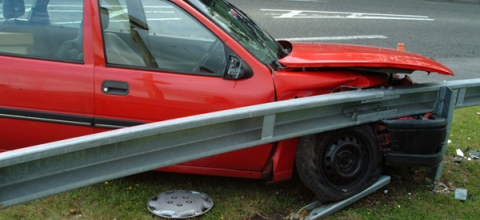Fatal road accidents in Wales are nearly twice as likely to include at least one person over the legal alcohol limit when compared to the rest of Britain. These worrying figures are from a recently released study by the Department of Transport looking into the causes of road accidents across the country. The shadow minister for transport and regeneration, Bryon Davies, described these figures as alarming saying, “We need to examine the reason why alcohol is a much greater contributory factor to serious car accidents in Wales and why a third of drivers killed on our roads are over the drink-drive limit.”
The Department for Transport estimated that 24% of those involved in fatal accidents in Wales, and 22% of those killed, were over the drink-drive limit – the figures for Britain are 13% and 14% respectively, nearly half as much. As well as this 9% of killed or seriously injured people in Wales had been found to have illegal alcohol levels in their bloodstream compared to just 6% in Britain.
What is being done?
The question on everyone’s minds is ‘why are these figures so high in Wales?’ When asked about the figures the official government organisation Road Safety Wales said they were unable to comment on any possible causes. Road Safety Wales is a collaborative effort between many Welsh councillors, assembly members and the police. Their mission statement is to create unity from diversity by developing and sustaining co-operation between all key partners across Wales and/or agencies with the responsibility for road safety promotion.
The organisation ran an anti-drink and drug-driving campaign this summer, before these figures were published, which made a concerted effort to deter people from driving while under the influence using random breath testing and raising awareness of the risks not only to the driver but to others. Chief Constable of the Dyfed Powys police Ian Arundale said, “If you drink and drive you will potentially not only ruin your life, but the lives of others innocently associated with you and your actions.” The campaign was backed by drink-driving victim Dr Mark Boulcott, a dental surgeon who lost his wife and was left disabled after a collision with a drink-driver who was three times over the legal limit. Dr Boulcott said, “My 13-year-old son was informed that his mother was dead and his dad probably wouldn’t survive the night.” During the month long campaign the police administered a total of 19,277 breath tests and 1.9% (360) tested positive, refused or failed to provide a sample.
However there is at least one assembly member who the campaign apparently didn’t reach. Plaid Cymru’s youngest AM, Bethan Jenkins, was arrested for drink-driving in LLandaff on 14 October. She has been charged with the offence and will appear in Magistrates Court on 19 December. Jenkins has since apologised to the police and to the public for her actions. She has been suspended by Plaid Cymru until the completion of the trial.
It’s generally thought that drink-driving rates increase around Christmas, due in part to the increase in social gatherings and the cold weather, however April 2007 to March 2010 statistics for Gwent police force show that 62% of casualties in drink-drive collisions occur in the summer months with only 38% in the winter months. However the Welsh police do conduct an annual All-Wales Drink/Drug-Driving Christmas Campaign. According to the Gwent police the campaign itself will also have the officers, “conducting high profile roadside checks and using intelligence to identify offenders 24 hours a day, seven days a week.“
What are the results?
It’s clear from the amount of work that the Welsh local government authorities and police are putting into lowering drink-driving rates that they are aware of the seriousness of the Department of Transport’s figures. But how effective are these measures? Last year Welsh police officers tested a total of 27,744 motorists as part of the Christmas campaign, with 545 individual (2%) returning either positive results, failing or refusing to take the breath test. The next comparable study was the campaign in the summer which had a result of 1.9%, although this shows a drop, until the figures for this year’s Christmas campaign are published it’s impossible to say for sure if the campaigns are having a long term effect. However one thing is certain; the four Welsh police forces have made it clear that they are cracking down hard on drink/drug-driving all year round.

